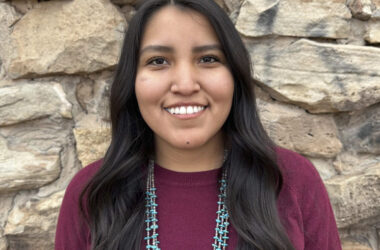Environmentally Conscious Consumers for Oil Shale (ECCOS) last week urged Colorado State Legislators to support environmentally responsible development of the state’s vast oil shale deposits as a key component of solving the country’s current energy crisis. The group’s chair, Peggy Rector of Rangely, testified before a special hearing on energy issues convened by state Representa-tive Kevin Lundberg (R-Berthoud) at the Colorado State Capitol in Denver.
Below is Rector’s full statement to the Colorado Legislature’s Republican Study Com-mittee.
“Good morning Mr. Chairman and members of the committee. My name is Peg Rector and I am the chair of ECCOS, Environmentally Conscious Consumers for Oil Shale. We are a community-based organization located in Rangely, Colo., that works to promote the development of the vast oil shale reserves in the Rocky Mountain region in order to increase our nation’s energy independence and strengthen the economy of the region. ECCOS supports projects that are done in an environmentally responsible manner and are responsive to the needs of local communities impacted by future oil shale development.
Thank you for the opportunity to speak briefly today about one of our state’s and nation’s greatest challenges — the availability of affordable domestic energy, and what we consider one of our state’s greatest potential energy sources — Colorado oil shale.
Let me first say that I am not a technical expert on oil shale. I know here in the room are representatives from some of the companies involved in the ongoing research and development projects. They, along with the National Oil Shale Association located in Glenwood Springs, are better able to address issues related to specific technologies and emerging extraction methods.
As a former mayor, county official and long-time community activist I see the incredible opportunities that exist if we develop our region’s energy reserves in a balanced and prudent manner.
The statistics are well-known but worth repeating. The richest and best oil shale deposits in the world are found in the Green River Formation in western Colorado, southeastern Utah and southern Wyoming. Oil shale underlies 17,000 square miles in the area. An area of about 1,225 square miles in Colorado’s Piceance Basin contains more than 80 percent of the region’s recoverable resource. Recoverable resources are usually considered to be at least 15 feet thick and yield at least 15 gallons per ton.
How large of a resource do we have? There are estimated to be 1.2 to 1.8 trillion barrels of oil here. Even by conservative estimates, there are 800 billion barrels of recoverable oil from oil shale in the area — that is three times greater than the proven oil reserves of Saudi Arabia. U.S. demand for petroleum products is topping 20 million barrels per day. If oil shale could be used to meet a quarter of that demand, 800 billion barrels of recoverable resources would last for many generations to come.
The history of oil shale in western Colorado and across the Rocky Mountain West, as many of you know, has been filled with high hopes and huge disappointments. For decades, large companies and individual entrepreneurs have been working to find an economically viable way to tap oil shale. The federal government has, at times, been very active in promoting oil shale development, including during the 1960s under then Secretary of the Interior Stewart Udall. Government subsidies, once considered a catalyst for technological innovation bore little results. Price controls and the expansion of a global oil market with affordable energy opened and closed the door to oil shale.
No one who was in western Colorado 25 years ago has forgotten ‘Black Sunday’ when the livelihoods of many of our neighbors and truly the economic future of the region was turned upside-down overnight with the abrupt halt of a large oil shale project.
So why go down this path? Because we have to.
The new energy economy notwithstanding, we must have oil for our economy to survive. And we must develop more domestic energy to remain secure. To be clear, we must increase conservation and improve energy efficiency. We must take a long-term view of energy’s impact across the economy. And we must expand development of all sources — wind, solar, geothermal, clean coal and biofuels. But our reliance upon oil will not diminish in a significant way in the immediate future.
Record fuel prices have hit every sector of the economy. Many of our overseas sources of energy are increasingly in the hands of unstable and hostile governments. We must look within our own borders and tap domestic resources if we are to maintain our economic and strategic position in the world.
We are several years away from a commercial scale oil shale industry in Colorado that is economically viable and environmentally sustainable. That should not be a deterrent. Martin Feldstein, former chairman of the President’s Council of Economic Advisors recently wrote, ‘It is possible to bring down today’s price of oil with policies that will have their physical impact on oil demand or supply only in the future. Any steps that can be taken now to increase the future supply of oil, or reduce the future demand for oil in the U.S. or elsewhere, can therefore lead both to lower prices and increased consumption today.’
If done right, oil shale development can provide significant economic benefits to Western Colorado while maintaining the rural character, agricultural businesses and outdoor recreational opportunities that have long-been the proud hallmarks of our region.
There remains a political roadblock that must be lifted before we can tap this tremendous resource. The U.S. Government owns and manages about 73 percent of the lands that contain significant oil shale deposits in the west. Today, in spite of a Congressional mandate contained in the 2005 energy bill, we have no commercial leasing program for oil shale in place. Companies willing to invest millions, or even billions, of dollars of their own capital have no regulatory roadmap forward.
Why? Because the leadership in Congress, including Senator Ken Salazar and Congressman Mark Udall, have placed a moratorium on the Bureau of Land Management issuing final commercial oil shale leasing guidelines. A draft set of regulations was issued in July but those cannot be finalized until the Congressional ban on domestic oil shale development is removed.
Congressional obstruction aside, there are bright spots on the policy front. Public pressure stemming from skyrocketing energy costs may be turning the tide in favor of expanded domestic production.
Our own Senator Wayne Allard has fought hard for balanced energy development in Colorado and is responding to his constituents’ calls for real energy solutions in a constructive way. His leadership in Washington will be missed.
Utah’s bipartisan Congressional delegation, especially Senator Orrin Hatch, has taken on the issue of oil shale development as key to our future energy security. Recently, Senator Hatch wrote a column entitled ‘Things you didn’t know about oil shale.’ In it, he thoroughly debunks many of the arguments we hear from the anti-energy crowd. I found one of his points surprising. ‘Did you know oil shale uses less water than ethanol and no more than gasoline? Increased ethanol production will require more irrigation. A September 2007 article in Southwest Hydrology states that irrigated corn requires more than 780 barrels of water for each barrel of ethanol. The Department of Energy reports that oil shale, for the entire process including land restoration, requires three barrels of water for every barrel of shale oil, about the same as gasoline.’
Mr. Chairman, I would like to provide the committee with a copy of the entire article written by Senator Hatch so that it can become part of the official hearing record.
In closing, we ask the committee and members of the legislature to join with us to increase our supplies of domestic energy, strengthen our national security, and allow local communities to chart their own course on economic development. As I mentioned, we are in the middle of BLM’s public comment period for draft commercial leasing regulations on oil shale. I hope that members of the committee will play an active role in this process by providing the federal government with comments in support of oil shale and encourage your colleagues to do the same.
We urge you to support environmentally responsible development of Colorado oil shale as a key component of solving the country’s current energy crisis.”





















